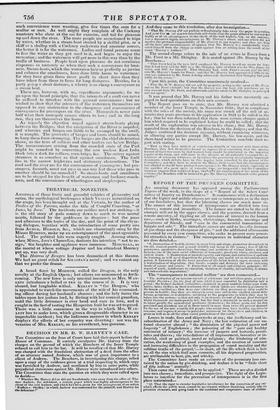DECISION IN MR. D. W. IIARVEY'S CASE.
TIIE Committee on the Inns of Court have laid their report before the House of Commons. It entirely exculpates Mr. Harvey from the charges on the ground of which the Benchers of the Inner Temple refused to call him to the bar. It will be recollected that Mr. Harvey was charged with the fraudulent abstraction of a deed from the office of an attorney named Andrew, which was of great importance to a client of Andrew. The Benchers, in investigating this charge, relied upon a copy of the evidence given at a trial respecting it, which copy was furnished by Andrew, and mutilated by him in some parts, while prejudicial statements against Mr. Harvey were introduced into others. The Committee thus state the question on which they were called upon to decide " Whether Mr. Harvey did or did not fraudulently take away from the office of Thomas Andrew, the defendant, a certain paper which was highly advantageous to the client of the said Andrew. and which hal been given for the arrangement of an action • Rudkin r. Shelley; in which Andrew was concerned for the plaintiff, and Harvey for the defendant ?" And they came to this resolution, after due investigation-. "That Mr. Harvey eid not purloin or fraudulently take away the pnper in question And your Coe ice canuot entertain aril doubt that the paper alluded to was not dm' highly or at alt advantageoLm to the client cf the 'aid Andrew, but, on the contrary, was a document highly advantageous to Mr. l'fasvey's client, and one which did mid involve the personal responsibility of Mr. Harvey in any respect; and they are, front all the facts and circumstances, of opinion that Mr. Harvey h:•.s satisfactorily vindicated himself from the charge so made against hint as arising from the result of the cause ' Ilarvey e. Andrew.'" The second charge refers to the sale of an estate in Essex from a Mr. Frost to a Mt. Skingley. It is stated against .13s. Harvey by the Benchers " That Frod had in the year l8:i9 employed Mr. Harvey to sell an estate for hint that it had been sal for 9501 to a Mr. Skingley, 430/, of which was for Miss Frost, his sister, and 500/. for himself. That Skingley bad. wiat Frost's assent, ;mid his 5013. into Mr. Harvey's hands for Frost; and that Mr. Harvey had appropriided 500/. to his own use, unknown to Mr. Frost, it being afterwards discovered that Sking,ley had paid 14501. for the estate."
Upon this point, the Committee unanimously resolved
That Mr. D. W. Harvey did not sell the itroperty. acting as the agent of Mr. and on Mr. Frost's behalf; but that Mr. Harvey was the bond fide purehaser on Ms own account front Mr. Frost, and afterwards sold the estate to Mr. Skingley as principal and not agent."
It was proved that Mr. Harvey and his father were constantly engaged in land speculations on their own account.
The Report goes on to state, that Mr. Harvey was admitted a member of the Inner Temple in November 1810; that in compliance with the rules of the society, his name was struck off the roll of attornies two years previous to his application in 1821 to be called to the bar; that he was then informed that there were certain charges against him which required to be explained before he could be called ; that the result of the explanation was adverse to his claim ; that Mr. Harvey appealed from the decision of the Benchers, to the Judges; and that the Judges confirmed the decision inst:tater, without examining witnesses, or allowing any parties except Mr. Harvey, his law-agent, and the
short-hand writer to be present. The Committee conclude their report with stating,
" That as they have arrived at conclusions directly at variance with those of the Ilenchers. they feel them:elves boand to express their conviction, that the opinion formed of those two cases by that learned body should be attributed to the imperfect reports of the trials, and still more to the absence of all authority to emnpel the attendance of necessmy witnesses. or to enforce the production of essentially important documents, which defects have in this inquiry beell retiledied by the powers of the Committee ; and they have to state to the House, their reo.et that the circumstances last alluded to should have produced consequences to Mr. Harvey which, especially in the sacrifice era great wee of valuable time, are irreparable ; but the Committee therelbre express their confident hope, thatottar the examination of the whole of the evidence, the Benchers will be induced to give Mr. II arvey the full benefit atilt! present inquiry."




















 Previous page
Previous page